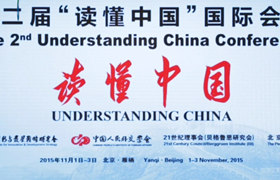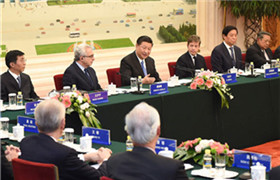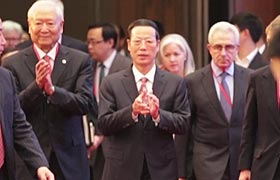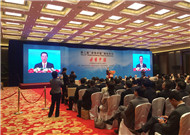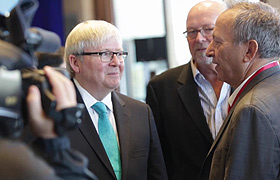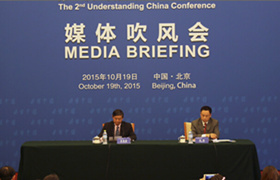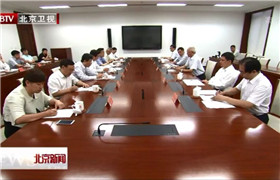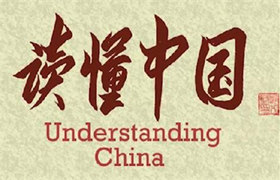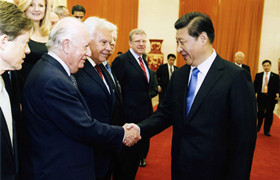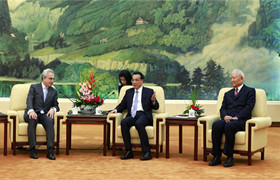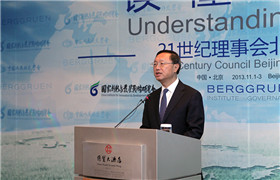- HOME--> Chairman
-
A Fundamental Decision is Called for in Sino-Us Relations
Source:CIIDS
--Conversation with Yale University professor Paul Gewirtz
Zheng Bijian
We need to make a good assessment of international relations in 2015, especially those between China and the US, which is strongly influenced by changes in world situation in 2013 and 2014. Here I refer specifically to the changes in three geographies along two lines and especially the southern line. We should understand who are behind the changes.
The three geographies. The first one is Europe, which has seen the changes in Ukraine. China has nothing to do with it. Was it caused by the Russians? It looks like it, especially in the public opinions of the West. But in fact, it was triggered by the expansion of NATO to the doorsteps of Russia. The real boss behind all this is the US. And secondly, who is behind the changes in the Middle East? Is it ISIS and other extreme forces? Looks like it. But it is actually the natural consequence of the two wars caused by the US in that region in the past ten years. The Americans went in, made a mess, and then left, throwing the Middle East in chaos! Thirdly, the line in the South, which is the Asia Pacific. Who has caused the complications in the East China Sea and the South China Sea? The US said it’s China, which is completely unjustified. The root cause still lies with the US, with its Return to Asia policy. Talking about Return, the US has never left the Asia Pacific. Return to Asia, or the Pivot, is to further consolidate the US-Japan military alliance and to support Japan to extend its reach. The US supports Abe to not only lift the bans on collective self defense but also to expand the scope of its military actions. The immediate evidence is a statement by Commander of the US Pacific Fleet saying the US would welcome Japan air and sea patrols in the South China Sea. Therefore, the root cause of the situation in the South China Sea is also the US.
But of course we see duality in this complicated development. Take the Asia Pacific for example, on the one hand, President Obama said that military alliance with Japan is the “cornerstone” of regional security, and on the other hand, he said cooperation with China is the “core” of security in this region. I fail see how these two statements are can be reconciled and if the US will continue like this in 2015? In fact, the litmus test would soon come. What are you going to say to Abe when he visits the US in April and what would you say to Chinese President Xi during his visit in September?
So that’s my first point, on the general situation.
My second point is on China. We sincerely wish to improve our relations with the US and develop with you a “new model of major country relations”. This policy has not changed and will not change, not even when we are getting closer with the Russians. This is very clear. However, because of the duality I spoke of just now, we must make comprehensive analysis and have to be prepared for developments towards either direction. The good news is that Abe will visit the US before President Xi does. So we will see how the meeting between Obama and Abe play out in April.
Having said my second point, I would like to sum up by making a third point. I hope the leaders of our two countries can make good use of the critically important opportunity of the summit in September 2015. It is time that we make sensible analysis of the situation and come to a “fundamental decision” on how we define our relationship in the world and where the relationship is going in the future? For this purpose I have three suggestions, which I had discussed with you and Mr. Hadley last time we met. First, we must clearly define the strategic importance of Sino-US relations as the “ballast” and “core” of Asia-Pacific peace and stability. That is to say, the US-Japan military alliance should not be taken as “cornerstone” of regional security. More specifically, Japan should not be allowed to patrol in the South China Sea in the name of lifting the bans on collective self defense. Secondly, we must actively implement the specific cooperation agreements signed between our two governments. Afterwards, we can, by taking into consideration of the situation in the world and particularly in the Asia Pacific, make a joint declaration. Otherwise our relationship can only be reduced to empty rhetoric and trivial matters. This is the “fundamental decision” as I understand it.
In short, as an observer and researcher, I would like to say that a “fundamental decision” is required for Sino-US relations, in addition to my thinking of “great changes, new awakening, duality and great developments are yet to come” as cited by you, Mr. Gewirtz.
This is an excerpt from Chairman Zheng Bijian’s conversation with visiting Yale University professor Paul Gewirtz in Beijing on March 18, 2015.
-
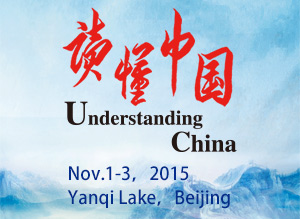
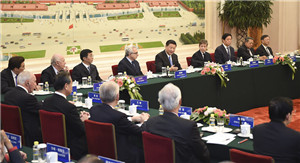
The 2nd "Understanding China" ConferenceOn November 1~3, 2015, the 2nd “Understanding China” Conference was held in Beijing Yanqi Lake International Conference Center. Zhang Gaoli, Vice Premier of the State Council, attended the opening ceremony.
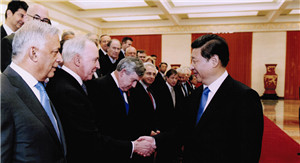
The 1st "Understanding China" ConferenceOn November 1~3, 2013, the 1st “Understanding China” Conference was held in Beijing, which was cosponsored by China Institute for Innovation & Development Strategy (CIIDS), Chinese People’s Institute of Foreign Affairs (CPIFA), and Berggruen Institute on Governance.
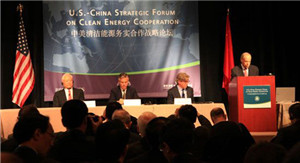
The 2nd U.S.-China Strategic Forum on Clean Energy CooperationWith the “Prospects for U.S.-China strategic cooperation in next decade” as its theme, the forum dwells on the implications of U.S.-China cooperation from the strategic perspective of coping with global challenges and maintaining world peace.
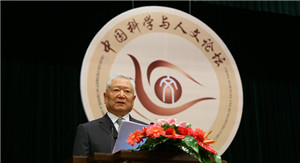
The China Sciences and Humanities ForumCo-initiated in April 2003 by renowned Chinese scientist Mr. Lu Yongxiang and influential political strategist Zhen Bijian, China Sciences and Humanities Forum was jointly hosted by Graduate University of Chinese Academy of Sciences (GUCAS) and the Higher Education Press.

